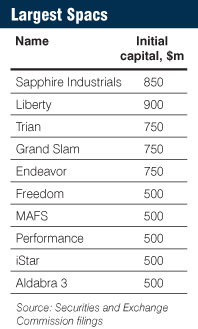 In 2007, special purpose acquisition companies, or blank-checks, made up 23% of the total number of IPOs. In other words, nearly a quarter of IPOs this year have been for businesses with no business. A blank check IPO exists to raise money, and then seeks to use that money to acquire another company.
In 2007, special purpose acquisition companies, or blank-checks, made up 23% of the total number of IPOs. In other words, nearly a quarter of IPOs this year have been for businesses with no business. A blank check IPO exists to raise money, and then seeks to use that money to acquire another company. For instance, Endeavor Acquisition went public as a blank-check IPO and then acquired American Apparel. Now the company trades as American Apparel (AMEX: APP), and Kevin Kelly wrote about why he thinks that company is a buy here.
Sometimes companies that go public through this process can be good investments, but there’s something investors need to keep in mind: A company that has been acquired by a SPAC has just been put up for sale and is therefore unlikely to be undervalued. If the sellers could have gotten more for it, they would have sold it to someone else.
A piece in the Wall Street Journal discusses (subscription req'd) blank checks and some of their pitfalls. American Apparel is definitely one of the better/most interesting companies to go public this way (the CEO’s alleged perversions aside) in recent years but, in general, I think blank checks are something for investors to avoid.
View original article
According to Fortune, blank check IPOs are popular again. Also known as special purpose acquisition companies (SPACs), these are IPOs that are done to raise money to possibly buy another company. That is, you are investing in a company with no business model, no sales… nothing. You’re just hoping that the management can find some brilliant acquisition that will create value.
Given the tendency of acquisitions to do anything but create value, you have to wonder why anyone would invest in a SPAC. But that doesn’t mean people won’t do it anyway. From Fortune: “SPACs have soared in popularity in recent years. So far this year, some 40 blank check companies have raised $5.3 billion through public offerings, compared to 13 companies that raised $484 million in all of 2004, according to Dealogic.”
The idea of investing in a company where you have no idea what the business will be is hardly new. During England’s 18th Century South Sea Bubble, a promoter raised money through a stock offering for “a company for carrying on an undertaking of great advantage, but nobody is to know what it is.”
View original article












